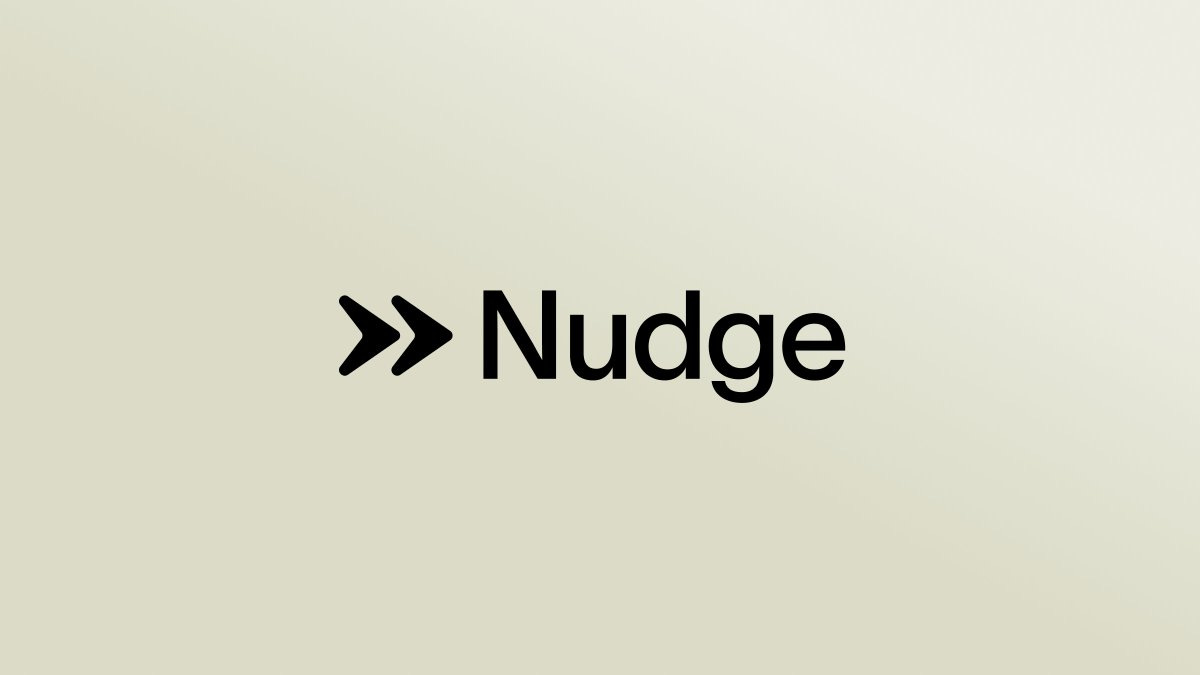Weekly Dose of Optimism #106
Nudge, Alzheimer's Detection, Robotic Ping Pong, Samsung Batteries, Anduril Series F, Embrace Innovation
Today’s Not Boring is brought to you by… Guidde
Guidde is the generative AI platform that lets anyone on your team create how to videos and visual documentation in seconds for your employees and customers.
Just click capture on Guidde’s browser extension, do the thing that you want to show others how to do, and the app automatically captures it and generates step-by-step video and text guides complete with visuals, voiceovers, and calls to action.
Use Guidde to put together training and onboarding materials, make new feature announcements, answer FAQs, and much more. It’s 11x faster than doing it manually, and saves you and your team from having to explain the same thing over and over. Plus, the extension is free. Try it here:
Hi friends 👋,
Happy Friday and welcome back to our 106th Weekly Dose of Optimism.
The Olympics are coming to an end this weekend. What a fun couple of weeks: photo-finishes, American dominance and, of course, the memes. These top athletes from around the world take the stage every four years and we get to enjoy watching them put it all on the line. We're the real winners here ❤️. Special s/o to my high school classmate Nick Mead, who along with Katie Ledecky, will be a flag bearer for America during the Closing Ceremony. His boat won gold in the men’s four rowing event, bringing home gold for the United States in the event for the first time in 64 years! Nick is the only Olympian I know and if the rest are anything like him, then we got a bunch of good people out there representing the Stars and Stripes.
There's a ton of folks with similar levels of dedication, raw horsepower, and skillfulness that don't dedicate their lives to Olympic sports. Maybe they’re scientists, researchers, or entrepreneurs pushing the frontiers of technology and science. Fortunately, they get their own version of the Olympics every Friday morning. It's called The Weekly Dose of Optimism.
Let’s get to it.
(1) Nudge
From Fred Ehrsam on X
We’re building an ultrasound headset to enhance human experience. Press a button to shift your brain state: go to sleep, boost focus, break habits, elevate mood, etc. We believe this device has the potential to improve people’s daily lives more than any other technology.
Earlier this week, Coinbase and Paradigm founder Fred Ehrsam revealed his new company, Nudge. The company describes its future product as, “an ultrasound headset to enhance human experience.” It promises the ability to simply push a button to alter your brain states, making it easier to fall asleep or boost focus or break a habit.
Ultrasound technology has advanced significantly in recent years, becoming more precise and miniaturized. Improvements include better imaging resolution, more compact transducers, and increased safety. Given these advancements, ultrasound can now be integrated into consumer devices for non-invasive brain stimulation and monitoring. Over the last couple of years, we’ve seen more startups take advantage of this: companies like Prophetic use ultrasound in its lucid-dreaming headset “Halo", Butterfly IQ developed a portable ultrasound device that makes scans more accessible, and our guess is that there will be a wave of ultrasound-based companies over the coming years.
Separately, Fred’s story is both one worth noting and one that we hope becomes less noteworthy over the coming years. Fred made a couple billion dollars rethinking crypto with Coinbase and then made more money betting on other crypto ventures at Paradigm…all by the time he was 35 years old. Fred is an entrepreneur with at least another 2-3 decades of horsepower left in him, billions of dollars of capital, and is deciding to take on important and hard challenges that can have a meaningful impact on society. Second and third time founders who got rich during the 2010s/early 2020s are going to have a massive impact on the next couple of decades of technology development.
(2) Blood tests could soon predict your risk of Alzheimer’s
Alison Abbott for Nature
This extraordinary turnaround in outlook for the disease that affects more than 55 million people worldwide comes down to two things — both of which were thought by many to be nigh on impossible just a decade ago. First, drugs that can slow the disease, if it is caught early enough, are now coming on the market. And second, scientists have developed relatively cheap and highly accurate blood-based biomarkers for Alzheimer’s.
We write about Alzheimer’s treatment a lot here at Not Boring. It’s personal for us — it runs in our family. So any time it comes up in the news, it naturally catches my eye. The story above is less about any one specific breakthrough, but how the combination of advancements made in early-detection and early-treatment is impacting Alzheimer’s treatment.
Previously, we’ve covered how new drugs, when administered to early-onset patients, have shown efficacy in slowing the development of Alzheimer’s in patients. Eli Lilly’s Kisunla, for example, has been proven to moderately slow cognitive decline, and could lead to patients living independently for longer periods of time.
As drugs, especially those that are more effective when administered earlier in the disease’s development, become more ubiquitous there will be an increased focus on screening and detecting Alzheimer’s earlier. Alzheimer’s prediction and detection have also come along way.
Blood-based biomarkers like amyloid-beta and tau proteins have become accurate enough for clinical use. These tests identify the presence of Alzheimer’s pathology before symptoms appear, enabling early intervention.
AI can enhance the analysis of MRI and PET scans, improving the identification of subtle brain changes indicative of Alzheimer’s. These scans visualize amyloid plaques and tau tangles, allowing for early diagnosis. Think Ezra, but for Alzheimer’s.
We’re getting early diagnosis + drugs to slow decline. Now we just need a treatment to knock out Alzheimer’s altogether.
(3) Achieving Human Level Competitive Robot Table Tennis
From Google DeepMind
Policy performance was assessed through 29 robot vs. human matches of which the robot won 45% (13/29). All humans were unseen players and their skill level varied from beginner to tournament level. Whilst the robot lost all matches vs. the most advanced players it won 100% matches vs. beginners and 55% matches vs. intermediate players, demonstrating solidly amateur human-level performance.
If you’re anything like me, you’ve probably watched a few of these Olympic events and thought — or even, claimed to your spouse — that “with a few years of training, I could probably do that.” Shooting, equestrian events, and table tennis all come to mind. Sorry to burst our bubbles here but even with a few years of training, we probably couldn’t compete. Robots on the other hand…now they’re a different story.
Google’s DeepMind released the results of a recent study in which its AI robot competed against a range of table tennis players. The robot swept its human beginner opponents, went ~50/50 with intermediates, but still lost all of its matches vs. advanced adversaries. But with the rate of improvement in AI and robotics, I wouldn’t be surprised to see an Olympic-level robot pingponger by the next summer Olympics.
Despite the losses, the research was still significant in that it demonstrates a robot achieving amateur human-level performance in a complex real-world task. The robot displayed a few things: a hierarchical and modular policy architecture, zero-shot sim-to-real techniques, and real-time adaptation to unseen opponents — all major steps towards getting a robot to perform human-like tasks.
Who knows, maybe we’ll see one of these robots in LA in 2028.
(4) Samsung Unveils Solid-State Batteries with 20-Year Lifespan and 9-Minute Charging Time
Krishi Chowdhary TechReport
The batteries are undoubtedly fantastic. Each of them has a lifespan of around 20 years, takes only 9 minutes to charge, and can power electric vehicles for up to 600 miles on a single charge.
Some electric news out of South Korea recently: Samsung revealed its newest solid-state battery that has a 20 year lifespan, can power EVs for up to 600 miles, and only takes 9 minutes to charge up. Mass production of these batteries is planned for 2027 and the hope is that the more effective batteries will drive down the costs of EVs further.
Notably, Chinese competitors already have access to similarly powerful batteries. As Noah Smith recently noted, the U.S. missed the battery revolution, whereas China has seized the lead in both battery manufacturing and development. There are a number of reasons why China has outperformed the U.S. in batteries — namely supply chain advantages and lack of political will in the U.S. — but there seems to be a shift back as the U.S. realizes the importance of having its own battery capabilities.
Still, the West relies heavily on South Korean (Samsung) and Japanese (Panasonic) battery production for its EVs. Samsung supplies batteries for companies like Ford, Rivian, and BMW, while Panasonic provides batteries for Telsa, Toyota, and also Ford.
Again, we won’t see these specific Samsung batteries in market for a couple of years, but better, cheaper batteries are only going to drive down the costs and increase the utility of EVs.
Anduril
This product is not a weapon itself, but a maker of weapons. It is a software-defined manufacturing platform to produce advanced defense capabilities at hyper-scale. It has been years in the making, and it will make possible everything we will build in the future. We call it Arsenal.
Packy here. Yesterday, Anduril announced that it raised a $1.5 billion Series (America) F (Yeah). Along with the raise, it dropped a manufacturing manifesto: Rebuild the Arsenal. In it, Anduril lays out its plans to build Arsenal-1, “a 5 million square foot state-of-the-art facility to produce autonomous weapons systems.”
The full document is worth reading to understand where Anduril believes warfare is heading, why we’re so far behind China in our ability to produce weapons, and how the company plans to lean into America’s strengths to reboot the arsenal of democracy. As someone who read Freedom’s Forge earlier this year, it got me fired up.
One thing in particular stuck out to me, in the last section on page 32. “Arsenal is founded on another idea that is diametrically opposed to existing defense industry practices: Rather than geographically distributing the production of different military programs, we will seek to consolidate it.” Because Anduril is putting hundreds of millions of dollars into the factory itself upfront, instead of trying to win government contracts to build it, it can do away with the political games that sprinkle a little bit of our supply chain in each important Congressional district. If it works, the government will ultimately be a funder, but putting up the cash up front to prove that there’s a better way is what Anduril has done on each of its products. Now it’s taking that up a level as it turns
Disclosure: we are investors in Anduril.
Bonus: The case for long-term tech optimism
Abundance Institute
Topping of the week with a cool video from the Abundance Institute that makes the case for tech-optimism. Lightbulbs, bicycles, planes, cars, mobile phones, personal computers — you name a technology that is ubiquitous and/or important today — all faced initial challenges and pessimism. It is all part of the technology development cycle. And in the beginning part of that cycle, it’s easy to be pessimistic. You may even sound smart! But the long-term, optimal strategy is to be optimistic about tech.
Take today’s lead-off story, Nudge. It’s easy to jeer at. A headset that shifts your brain states…sounds like a crypto-billionaire’s pet project that is never going to work. And in fact, I’d bet the first couple of iterations of Nudge are pretty underwhelming. Hell, Nudge as a company may even fail. But I’d also be willing to bet that over the next ~20 years, we have affordable, effective devices that use ultrasound (or a similar technology) to positively impact our day-to-day lives.
You can sound smart today or be right in the long-term. History tells us the latter is almost always the right choice. Which Steve do you want to be?
Have a great weekend y’all.
Thanks to Guidde for sponsoring! We’ll be back in your inbox on Tuesday.
Thanks for reading,
Packy + Dan







This newsletter is so informative and written with much care. Thanks for sharing.
It’s early years in the Battery War. If Samsung’s battery is superior (2027), why is it pursuing a better battery with a silicone anode and a technology to mitigate thermal runway? This battery is designed and manufactured by an American company. As you know, the greater the energy density in an Li-ion battery, the greater the risk of fire. Sixty seconds after an Li-ion battery experiences a short circuit (EV crash, over-charging batter pack, etc.), the fire reaches 1,000F and starts spraying/spewing molten substrate. In a bad auto accident, is a driver capable of getting out of an EV in less than 60 seconds? NYFD responded to 163 Li-ion battery fires in 2023. There were 142 battery fires on commercial airline flights in 2023. How long before the insurance lobby pressures the government to raise Li-ion battery standards?
If the Chinese are in the lead in the Battery War, why are two of the largest Chinese smart-phone manufacturers in the product-fit, the last stage, for this battery? If Chinese batteries are superior, why did a large, California-based OEM of VR headsets sign a contract with this company for its battery pack?
This company is in talks with a major OEM of EVs. The EV battery is scheduled to begin production in 2025. If this battery didn’t provide a significant and safe first-mover advantage, why are all of these discussions and contracts cloaked by NDAs (read: the clients will announce this at product releases?
The point being, the Battery War is early years. Given the battery manufacturing facilities a Samsung and other major battery manufacturers have, to say nothing of these countries’ work ethic, redesigning existing battery manufacturing lines, the ramp-to-scale is suitably fast.
Even Elon Musk has stated: “The silicone anode is the way forward for lithium-ion batteries.”
This battery, already in use by the US Army for two-way radios, will make it practical to bring AI to smart phones and run true 5G (as we know, smart-phone OEMs purposely engineer their product not to run on 5G, for obvious reasons).
Qualcomm was an early investor in this company (full disclosure: so was I). Last year, Christiano Anon stated: “Mobility isn’t going away. Soon AI will come to smart phones, and the only cost will be the battery.”
Again, it’s early days in the Battery War.